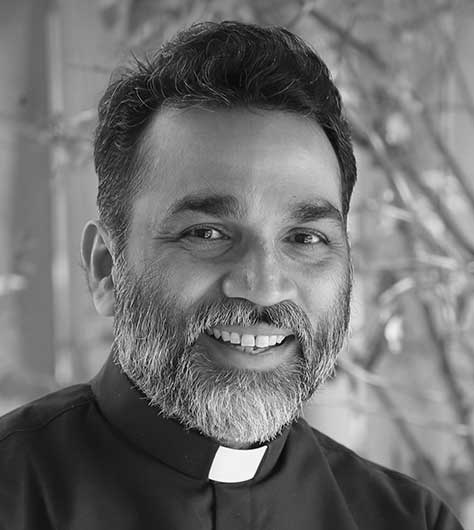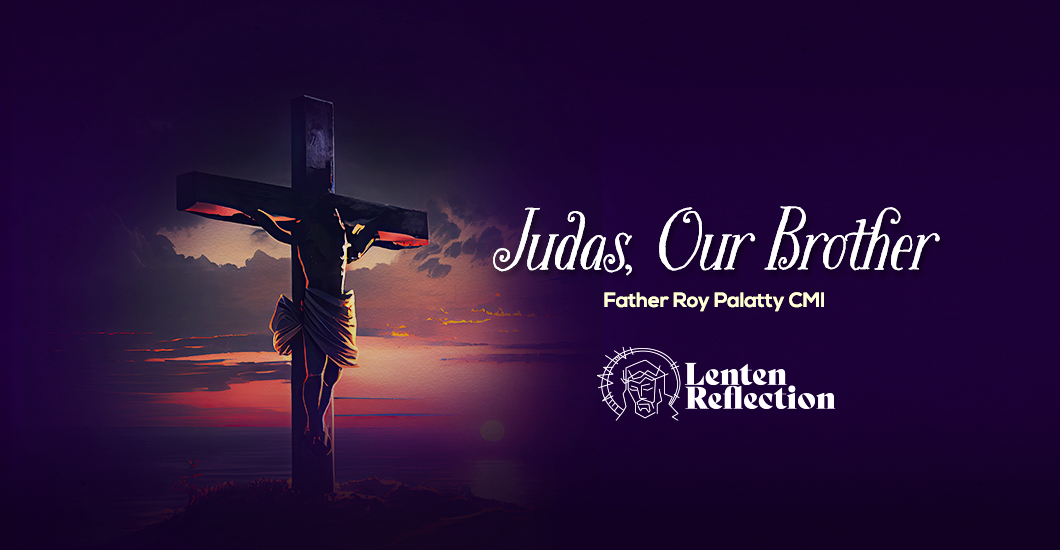Home/Lenten reflections/Article
Trending Articles
Judas, Our Brother
Father Primo Mazzolari was one of the great public figures of mid-twentieth century Italy. His homily on Holy Thursday in 1958, a year before his death, which he titled “Our Brother Judas” is well-known. At the heart of the homily are the words of Jesus upon Judas’ arrival at the Garden of Gethsemane: “Friend, do what you have come for” (Matthew 26:50). “Friend” was what Jesus addressed him as at their last encounter. Even after his betrayal, Jesus expressed love, mercy, and even friendship towards this betrayer. This was an invitation to examine the inner life of Judas. We don’t know if even that tender word penetrated his heart. But we know one thing: Judas must have remembered that powerful and lovely word ‘friend’ at the moment when he hung himself on the tree. ‘O Judas, my friend…!’
Still, we are sure when Jesus prayed from the Cross, “Father, forgive them, for they know not what they do,” he certainly did not exclude Judas from those he prayed for. It is true that Jesus had predicted about Judas, “none of them was lost except the son of destruction” (John 17: 12). Another terrifying statement about Judas: “It would be better for that man if he had never been born” (Mark 14:21). But, as in many other instances, he had spoken from the perspective of time and not of eternity. The eternal destiny of a human being is an inviolable secret kept by God.
“We may betray Christ’s friendship, but Christ will never betray us, his friends; even when we don’t deserve it, even when we turn against him. Even when we deny him, in his eyes and in his heart, we are always friends of the Lord…. Poor Judas. Our poor brother. The greatest sin is not to sell Christ; it is to despair” (Primo Mazzolari).
We cannot pass a hasty judgment on him. The betrayal of Judas continues throughout history. Judas sold the Head, while his imitators continue to sell the Body, the members of the Body of Christ. Judas’ betrayal continues through the lives of each of us when we fail to confess our sins.

Father Roy Palatty CMI is a priest of the congregation of the Carmelites of Mary Immaculate. He earned his Ph.D. in Philosophy from the Catholic University of Leuven in Belgium and is a published author of books and articles. Since 2014, he has been serving as Spiritual Director of Shalom Media, a Catholic media ministry based in South Texas. Shalom Media is home to SHALOM WORLD Catholic television network and publishes Shalom Tidings bi-monthly magazine. Father Varghese is a gifted speaker and has been an in-demand preacher around the world, leading numerous retreats for priests, religious, and lay people.
Related Articles
Latest Articles
How can your peace be restored when facing the challenges in life? Sewing is one of my favorite hobbies. I especially enjoy putting together pieces of fabric to create quilt tops. One particular design of mine is called a ‘Crazy Quilt.’ It consists of sewing random scraps, of otherwise useless pieces of fabric, together in such a way that it resembles a mosaic pattern. One day, when working on Crazy Quilt blocks, it occurred to me that each block resembled broken pieces of pottery that, when put together, recreated its own beautiful pattern. It also reminded me that sometimes life can feel like it’s broken into pieces, yet in the Potter’s hands, God can reconstruct those pieces into a new life. God is the source of all peace, but concupiscence caused by original sin can result in God’s peace within us being severed by challenges, temptations, or sin that draw us away from Him. Severed peace makes life feel broken and without purpose. But there is hope, for there’s always hope in God. The Book of Genesis, when read through God’s lens, is clearly the most wonderful love story—our love story with Him. Throughout the creation passages in Scripture, God remarked that everything He created was good. However, on the sixth day, when God created mankind, He said: “It was very good!” Why ‘very good?’ Simply because God created us in His image of goodness so He could love us and be loved in return. A Gentle Reminder All mankind was meant to love completely and live in peace under His protection. However, humanity, through Adam and Eve, chose to challenge God’s goodness, disobeying Him and thereby stepping out of His protection and peace when they chose to believe Satan (the Prince of Lies) over God. Their unfortunate choice, called ‘original sin,’ resulted in the shattering of their peace through the challenges, temptation, and sins that entered outside of God’s protection. His peace had been broken. God is good and He loves us, so He didn’t leave us this way. The Bible’s entire Old Testament details centuries of His efforts to re-establish the relationship He had with us in the Garden of Eden. However, as He was trying to get our attention, the Prince of Lies began to confuse mankind through temptations that led to more sin, pulling humanity further from God. Not to worry though, for Saint Paul reminded us that ‘God is for us’ and that nothing “in all creation, will be able to separate us from the love of God in Christ Jesus our Lord.” (Romans 8:39) How? Because God came for us Himself. “For God so loved the world that He gave His only Son, so that everyone who believes in Him may not perish but may have eternal life.”(John 3:16) It’s unfortunate that we didn’t have a say when the choice was made to commit original sin, but we can reverse the outcome of that sin by choosing to accept and follow Jesus, the Son of God, who is the Prince of Peace(Isaiah 9:6). He wants to lead us back to the Father in Heaven, but often, getting to Him is difficult when we have to step over all the painful broken pieces in our lives. Remember, Scripture is His love story to us. He knows our struggles and assures us that He is our refuge and our strength. Back to the Crazy Quilt It’s amazing when the numerous fabrics, patterns, and colors of a Crazy Quilt that are stitched together somehow blend to create a beautiful quilt top. Scripture reveals that God’s pretty crafty too. Not only is He a potter (Isaiah 64:8), but also He knits (Psalm 139:13), and I like to think He even sews. I wonder if He might see mankind as His own ‘Crazy Quilt’ creation. Although not His original design, we’re a collection of broken pieces all put back together again; He has recreated us, for “If anyone is in Christ, there is a new creation: everything old has passed away; see, everything has become new!”(2 Corinthians 5:17) So, when challenges, temptations, or sin are severing the peace within us, let this inherent thought bring you comfort: “We know that all things work together for good for those who love God, who are called according to His purpose.”(Romans 8:28) What’s that purpose again? God created us in His image of goodness so He could love us and be loved in return. Is there anything better than a warm quilt and a wonderful love story with a happy ending?
By: Teresa Ann Weider
MoreIs it a miracle or a coincidence? I had been working on an article for several days, arduously trying to get my facts right so that the end product I presented was as authentic as possible. Then, all of a sudden, I hit the wrong button, and almost all of what I had written over the past few days disappeared from my entire computer. Nothing worked, no matter how much I tried and how many IT experts I consulted. I had two choices either to try again fruitlessly to retrieve my lost work or to rely on the power of prayer to somehow miraculously retrieve it. Desperate Times, Desperate Measures In the meantime, I felt that I had made a copy of the unfinished work somewhere in the process. So I searched everywhere, in every nook and cranny, in every plastic bag I now use as my case or valise, desperate for a copy of this lost venture, but without success. Trying to replicate all those hours of thought and written words was such a dirge, but I tried to console myself. I desperately prayed to all the Saints of God, particularly one of my favorites, Saint Anthony of Padua, the patron Saint of lost things. My eagerness to finish the article caused me so much anxiety that I even lost sleep over it. I couldn’t content myself until I found the missing half of my article. This continued until the weekend, when I finally decided to dive into a new version of my original idea, forfeiting any hope of finding any semblance of my original thoughts. I sat by my computer, hit my story on the desktop, and thought about where I was to begin revising my original story. Suddenly, I glanced towards my printer, where I spotted a sliver of four pieces of paper protruding from my printer. I ignored it because it must be a remnant of what I was working on earlier. However, before hitting the print button on my latest endeavor, I extracted the A-4 pages. Surprisingly, the article's title matched exactly what I had been desperately searching for over the last week. I couldn’t believe my eyes. How could this be so? An article that I, and every close and known acquaintance of mine, had been unsuccessfully searching for over the past week or so surprisingly appeared on my printer out of the blue. This spiritual experience left an indelible mark on my psyche. I know we leave so many existential happenings to ‘coincidence’. I realized how gracious our God is in allowing His Holy Angels and Saints to come to our aid with the slightest requests.
By: Sean Hampsey
MoreDiscover how a simple snowflake can inspire you. As I drove to the Church, the snow that was supposed to turn to rain continued to fall. Individual flakes hit my windshield, quickly revealing their uniqueness before melting away. By the time I exited the Church after Mass, the snow lightly blanketed the ground. It was beautiful! Dressed in white, the barren farmland and the trees that had shed their colorful leaves no longer looked so desolate and dead. Despite the cold, the snow spread a sense of hope through the air. Of course, my children were hoping the snow would continue so that they would not have to go to school. In my part of the world, snow does bring school-age children such hope and joy. But the feeling I had that day walking out of the church was different. Standing amid the falling flakes, a verse from Psalm 51 came to mind: “Wash me, and I will be whiter than snow.” Therein lies the hope I felt – the knowledge that God loves me despite my weaknesses and sins. I need only to ask for His forgiveness and supernatural help to overcome them. He wants to cover me with His love and mercy like the snow falling gently on the earth. Thriving in Grace I took solace in the gradual covering. Our Lord is patient with us. He does not dump graces on us but allows us time for transformation. He gently leads us on the path of conversion. As I gingerly walked across the parking lot, I appreciated the baby steps we take on our journey that leads us to become the saints God is calling us to be. He delights in even our smallest progress. By afternoon, that which was a field of overturned dirt was now a woolen blanket. How amazing that those little flakes gathered together make such a difference! Such is the transformative power of grace! At every Mass when we receive Holy Communion, our souls are washed clean in the Blood of the Lamb. With each sacramental confession, we are reconciled to God and to one another. The ‘dirt’ from sin that stains our souls is washed away by the graces bestowed in these two powerful yet gentle Sacraments. Then, God sends us out into the world. Each of us, as unique as a snowflake, has our own gifts and talents. We share the Gospel in our little part of the world. Perhaps we feel like we don’t do enough, or aren’t effective enough. We feel as tiny as that snowflake. But consider how God needs each snowflake to do its little part to cover the land. Together, we can change the world! I do not have to do it all by myself. Neither do you. We just need to land where God places us and be the unique person He created us to be, spread God’s love, and make known all the good He does for us. The world will be a brighter place if we do.
By: Kelly Ann Guest
MoreHow does any parent survive the death of a child? I cannot begin to answer this question as a professional counselor but only as a mother who has lived through the worst nightmare of her life. We were blessed with two boys who were the joy of our lives. The night of the accident, my husband Cliff and I, along with our 15-year-old son Chris, spent an indescribable, terrifying night waiting, hoping, and praying that David, our 17-year-old, would somehow return home safely. The accident occurred around 10:30 pm, but the highway patrol never discovered it until 7 am the next day. When we received the horrible news, our scant flicker of hope crumbled helplessly within our hearts. I cried from the depths of my being. I was emotionally numb. Looking back after all these years, I see how God, in His compassion and love, supplied my body and spirit with an emotional safeguard that temporarily blocked out the enormous shock of this painful, unbearable reality. Thinking of that night reminds me of the touching words of the poem entitled Footprints in the Sand, in which our loving God said: “During your times of trial and suffering when you see only one set of footprints, it was then that I carried you.” God continued to carry our grief-stricken family through the painful funeral, the processing of life insurance claims, and the closing out of David's checking account. Each time I had to do these necessary things, I asked Jesus to give me strength. Tackling Grief After three weeks, I went back to work. I felt as though I was leading a double life during the months that followed. I would drag myself to work each day, drained and consumed with a deep sadness. For months, I felt as though I was an actress playing a part in a real-life drama. I tried to function normally at work, attempting to perform my required duties. At home, behind closed doors, I could then be true to my feelings and sob from the deepest part of a mother's grieving heart. Crying often became my only cleansing release. In this age of fast food, high-speed Internet, and instantly replaceable everything, society has a hard time accepting the fact that deep grief takes time to heal. If a person has a physical injury, he or she is pampered and taken care of until the wound has been completely healed. But it seems if a person has an emotional injury, he or she is expected, in a short while, to show up for work and be as efficient as ever. I finally had to accept the fact that society as a whole didn't consider emotional wounds to take time to heal. I had shared one part of that journey earlier in an article titled Impossible Made Possible*. Healing is not a single-moment-magic. I continued into the next year, processing through my pain and loss. With special dates like Thanksgiving, Christmas, David's birthday, and what would have been his high school graduation, I regressed into a deep sadness, filled with many days of crying. The professionals in the field of grieving state: “The healing process is more like a lightning bolt, full of ups and downs, progressions and regressions, dramatic leaps and depressing backslides.” When my sorrow overwhelmed me, God always sent caring neighbors, understanding friends, and loved ones. They each listened, loved me, and helped me to go on. Into the second year of processing my grief, I became aware of my deep hidden guilt. My guilt stemmed from an acute sense of regret about not being able to say all the many things hidden deep in my heart to my son David while he was alive. I knew, as a mother, I had made many mistakes while raising my son. I felt it was too late to share those precious thoughts and feelings with him. I suffered over this and asked God to forgive me. I felt God had forgiven me, but I couldn't forgive myself. I decided to write my son a letter in which I was able to express my deepest thoughts and feelings to him. After I finished the letter, I felt a sense of cleansing and release. David's physical life is over, but his soul is with Jesus, surrounded by unconditional love. This is indeed the promise that Jesus holds out to each of us. “I am the resurrection and the life. Those who believe in Me, even though they die, will live.” (John 11: 25) I have a renewed sense of hope because I know that I will see my child again at the Heavenly Banquet being prepared by our Father in Heaven. Through experiencing deep anguish and sorrow, I have emerged as a more compassionate person. As I release my son in love, I have received the healing power of God's grace. As my wounds have healed, so do I become an instrument of God's grace in reaching out to others who are grieving… *You can read the article Impossible Made Possible here: shalomtidings.org/impossible-made-possible
By: Connie Beckman
More







